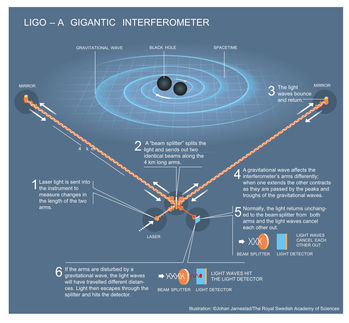The Nobel Prize Winners 2017
Internal clock, gravitational waves and cold analysis
This year's Nobel Prizes were awarded to a total of nine scientists. The research areas that have been awarded and the prize winners at a glance:
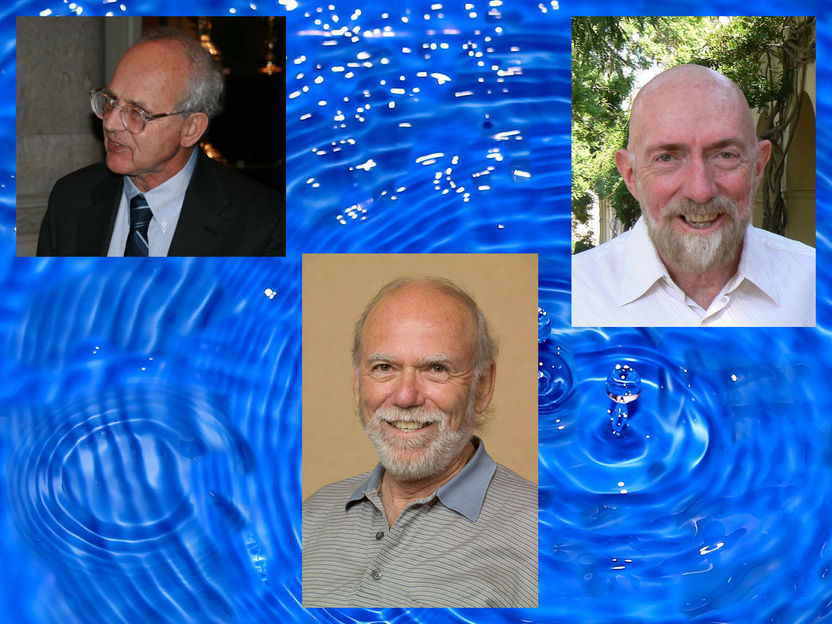
Rainer Weiss (left), Barry C. Barrish (center) and Kip S. Thorne (right) - Nobel Prize laureates in Physics 2017
Rainer Weiss: Michael Hauser, Barry C. Barish: R. Hahn, Kip S. Thorne: Keenan Pepper; Wikimedia Commons; pixabay.com
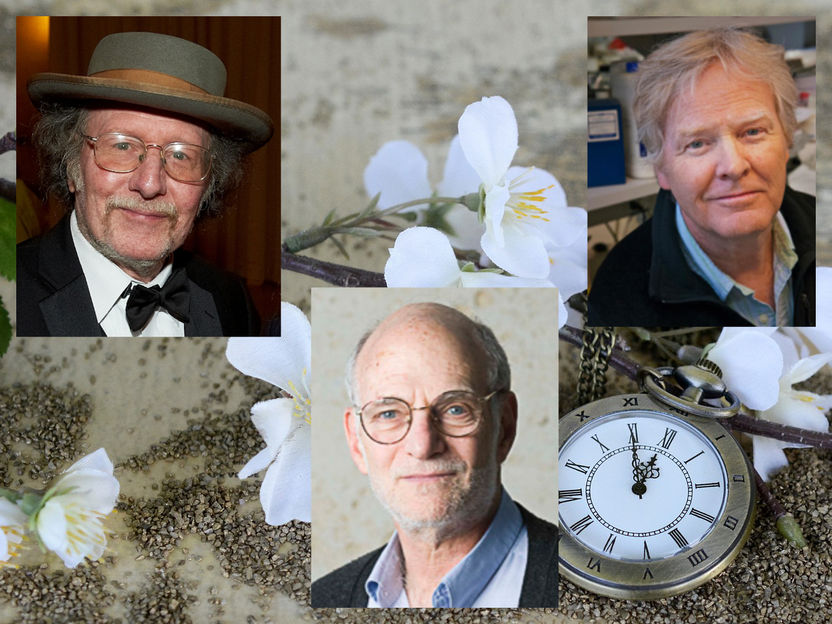
Jeffrey C. Hall (left), Michael Rosbash (center) and Michael W. Young (right) - Nobel Prize laureates in Physiology or Medicine 2017
Karolinska Institut & pixabay.com
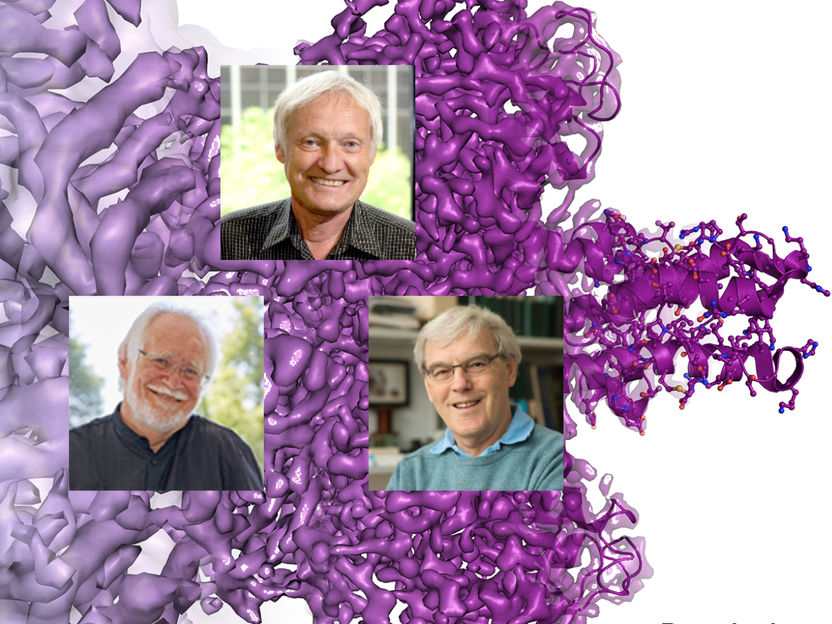
Jacques Dubochet (left), Joachim Frank (center), Richard Henderson (right) - Nobel Prize laureates in Chemistry 2017
Jacques Dubochet: EMBL; Joachim Frank: Columbia University; Richard Henderson: MRC; Background: © Martin Högbom/The Royal Swedish Academy of Sciences
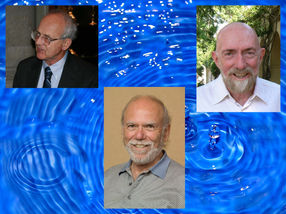
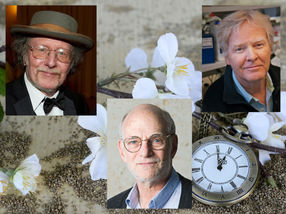
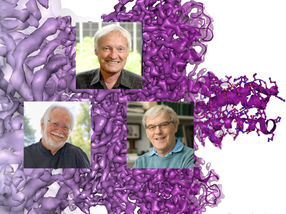
Nobel Prize for Physiology or Medicine
The Nobel Committee at the Karolinska Institute has awarded the Nobel Prize in Physiology or Medicine to the American scientists Jeffrey C. Hall, Michael Rosbash and Michael W. Young for their work on the internal clock of living beings.
- Jeffrey C. Hall was born 1945 in New York, USA. He received his doctoral degree in 1971 at the University of Washington in Seattle and was a postdoctoral fellow at the California Institute of Technology in Pasadena from 1971 to 1973. He joined the faculty at Brandeis University in Waltham in 1974. In 2002, he became associated with University of Maine.
- Michael Rosbash was born in 1944 in Kansas City, USA. He received his doctoral degree in 1970 at the Massachusetts Institute of Technology in Cambridge. During the following three years, he was a postdoctoral fellow at the University of Edinburgh in Scotland. Since 1974, he has been on faculty at Brandeis University in Waltham, USA.
- Michael W. Young was born in 1949 in Miami, USA. He received his doctoral degree at the University of Texas in Austin in 1975. Between 1975 and 1977, he was a postdoctoral fellow at Stanford University in Palo Alto. From 1978, he has been on faculty at the Rockefeller University in New York
Nobel Prize in Physics
The Royal Swedish Academy of Sciences honours the American scientists Rainer Weiss, Barry C. Barish and Kip S. Thorne for their achievements in detecting gravitational waves.
- Rainer Weiss, born 1932 in Berlin, Germany. Ph.D. 1962 from Massachusetts Institute of Technology, MIT, Cambridge, MA, USA. Professor of Physics, Massachusetts Institute of Technology, MIT, Cambridge, MA, USA.
- Barry C. Barish, born 1936 in Omaha, NE, USA. Ph.D. 1962 from University of California, Berkeley, CA, USA. Linde Professor of Physics, California Institute of Technology, Pasadena, CA, USA
- Kip S. Thorne, born 1940 in Logan, UT, USA. Ph.D. 1965 from Princeton University, NJ, USA. Feynman Professor of Theoretical Physics, California Institute of Technology, Pasadena, CA, USA
Nobel Prize in Chemistry
The Royal Swedish Academy of Sciences honours the scientists Jacques Dubochet, Joachim Frank and Richard Henderson for the development of cryoelectron microscopy.
- Jacques Dubochet, born 1942 in Aigle, Switzerland. Ph.D. 1973, University of Geneva and University of Basel, Switzerland. Honorary Professor of Biophysics, University of Lausanne, Switzerland.
- Joachim Frank, born 1940 in Siegen, Germany. Ph.D. 1970, Technical University of Munich, Germany. Professor of Biochemistry and Molecular Biophysics and of Biological Sciences, Columbia University, New York, USA.
- Richard Henderson, born 1945 in Edinburgh, Scotland. Ph.D. 1969, Cambridge University, UK. Programme Leader, MRC Laboratory of Molecular Biology, Cambridge, UK.
Most read news
Topics
Organizations
Other news from the department science

Get the analytics and lab tech industry in your inbox
By submitting this form you agree that LUMITOS AG will send you the newsletter(s) selected above by email. Your data will not be passed on to third parties. Your data will be stored and processed in accordance with our data protection regulations. LUMITOS may contact you by email for the purpose of advertising or market and opinion surveys. You can revoke your consent at any time without giving reasons to LUMITOS AG, Ernst-Augustin-Str. 2, 12489 Berlin, Germany or by e-mail at revoke@lumitos.com with effect for the future. In addition, each email contains a link to unsubscribe from the corresponding newsletter.
